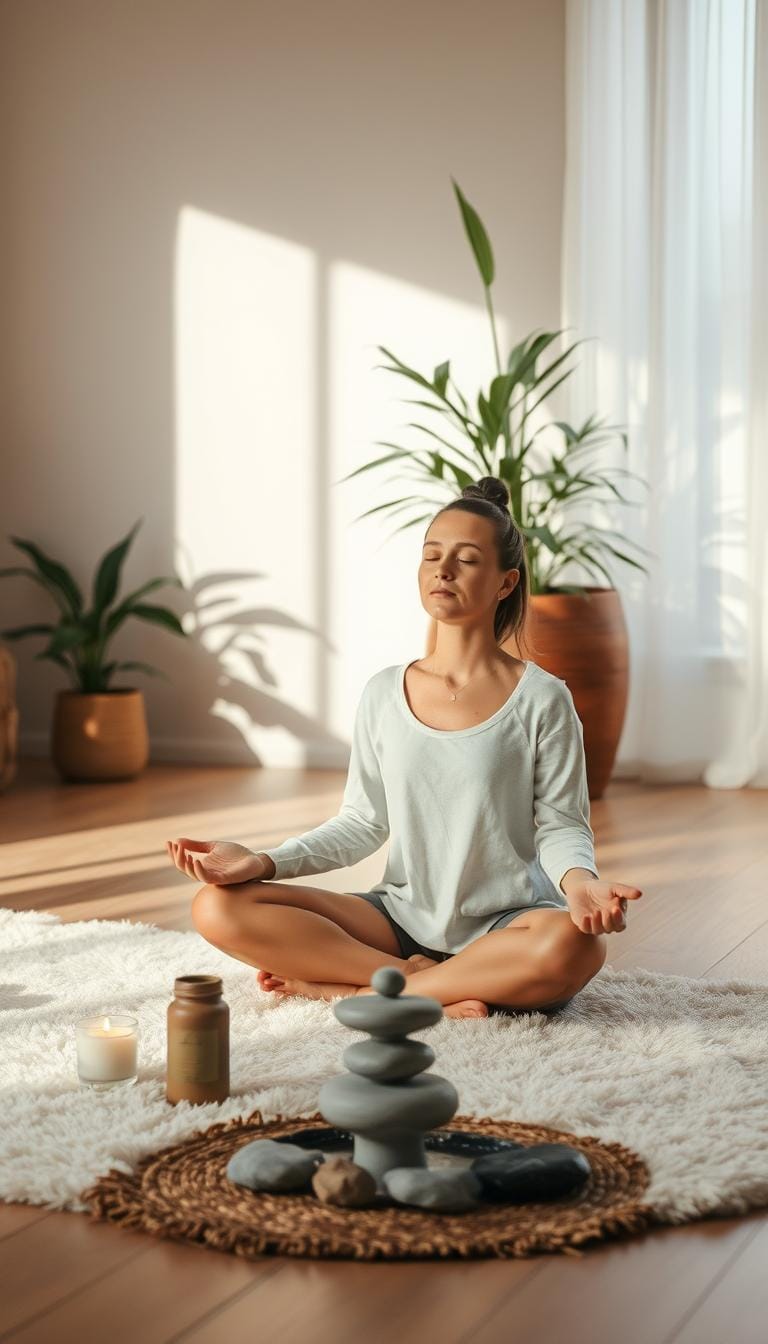Emotional Permanence: 7 Signs You Need Better Feeling
Table of Contents
Emotions can be hard to predict, but building emotional permanence is vital. It helps in lasting relationships and inner peace. This guide will show you how to find gaps in your emotional stability. It also teaches you how to strengthen them.

Feeling unsure about your partner’s loyalty or getting upset over small things? Your emotional foundations are important. This article dives into the science of emotional permanence. It explains how it impacts trust, resilience, and your sense of security in life.
Key Takeaways
- Emotional permanence affects how you handle stress and maintain healthy connections.
- Seven signs like trust issues or extreme mood swings point to weak emotional foundations.
- Science shows early life experiences shape your ability to feel emotionally stable.
- Mindfulness practices can rebuild emotional intelligence over time.
- Understanding these signs is the first step toward lasting emotional stability.
Understanding Emotional Permanence and Why It Matters
Emotional permanence helps us trust in relationships, even when life gets tough. It’s like an emotional anchor that keeps us feeling secure. It tells us that our loved ones are always with us, even when we’re apart.
This skill starts when we’re young and grows as we get older. It’s a key part of how we develop emotionally.

The Science Behind Emotional Object Permanence
Psychologists say this idea comes from Jean Piaget’s work on object permanence in babies. Just like babies learn objects exist even when they can’t see them, we learn that people’s love stays with us, even when we’re apart. Studies show this skill is linked to emotional development in adults.
How Emotional Permanence Develops Throughout Life
| Stage | Key Milestones |
|---|---|
| Childhood | Secure attachment with caregivers |
| Adolescence | Navigating peer relationships |
| Adulthood | Building lasting commitments |
Having a strong emotional base in childhood helps us in adulthood. Without it, we might find it hard to trust in relationships.
The Connection to Relationship Stability
- Low emotional permanence → fear of abandonment
- High emotional permanence → healthier conflict resolution
Healthy relationships need trust that love lasts, even through tough times. This belief helps us build stronger bonds and feel less insecure.
Sign: Intense Anxiety When Loved Ones Are Absent
Ever felt your heart racing when your partner doesn’t text back right away? Or worried for hours that a friend’s late call means they’re gone for good? These feelings show a deeper struggle with emotional regulation. For many, being apart from loved ones causes intense anxiety that goes beyond just missing them.
It’s that feeling of dread where every unanswered message seems like proof they’ll leave you for good.

Think about how you react when someone you care about is out of sight:
- Do you check their social media obsessively?
- Does silence in conversations feel like a silent rejection?
- Do you imagine worst-case scenarios—abandonment, betrayal, or sudden distance?
These patterns suggest your brain isn’t “storing” the security of their presence. Healthy emotional control lets us feel calm knowing love persists even when we’re apart. Without that, absence becomes a trigger.
Normal missing feels like a gentle ache that eases with distraction. But anxiety feels like a relentless storm—panic attacks before plans change, hypervigilance over tiny details, or needing constant reassurance to “prove” they care. This isn’t just clinginess—it’s a sign your emotional foundations need strengthening.
The Impact of Childhood Experiences on Your Emotional Regulation
Childhood experiences shape how we manage emotions as adults. Early interactions with caregivers set the stage for emotional regulation. This affects how we handle stress, conflict, and connection. Understanding this link is key to improving emotional health.
Attachment Patterns and Their Long-term Effects
Attachment styles formed in childhood directly affect adult relationships. Here’s how:
- Secure attachment: Builds confidence in trust and stability.
- Anxious attachment: Leads to fear of abandonment and clinginess.
- Avoidant attachment: Causes emotional distance and isolation.
- Disorganized attachment: Creates chaotic or fearful responses to closeness.
Healing Early Emotional Wounds for Better Stability
Therapeutic tools like emotional regulation practices can rewire these patterns. Effective approaches include:
| Approach | How It Works | Benefits |
|---|---|---|
| EMDR Therapy | Processes trauma through eye movement desensitization. | Reduces hypervigilance and improves coping. |
| Cognitive Behavioral Therapy (CBT) | Challenges negative thought patterns linked to past wounds. | Builds practical skills for managing triggers. |
Breaking Generational Patterns of Emotional Instability
Patterns like avoidance or anxiety often repeat across generations. Breaking them requires:
1. Recognizing inherited behaviors through self-reflection.
2. Seeking therapy to address learned responses.
3. Teaching children healthy emotional expression to disrupt cycles.
Small steps today can create lasting change. Prioritizing emotional health means rewriting old stories and fostering resilience for future generations.
Sign: Difficulty Trusting Others’ Consistent Feelings Toward You
Do you often wonder if friends or partners really care about you after fights or time apart? This feeling of always needing to check if they care is a warning sign. It shows you might struggle with emotional well-being, always thinking the worst instead of trusting the good times you’ve shared.
- Replaying texts to spot “hidden” negativity
- Accusing others of “hating you” after minor disagreements
- Checking social media obsessively during conflicts
These actions come from a deep need for certainty. When you can’t feel sure that others care, your emotional health takes a hit. Relationships can get strained because of this constant doubt. For example, always asking if someone is mad at you after a small argument can make them feel uneasy and push them away.
Starting to notice this pattern means paying attention to when you doubt others’ loyalty. Writing down your interactions or talking to a therapist can help change these thoughts. Taking a moment before reacting to perceived slights can help rebuild trust in your relationships and with yourself.
Building Emotional Resilience Through Mindfulness Practices
Small daily steps can boost your emotional resilience and emotional intelligence. Mindfulness isn’t just a trend—it’s a tool anyone can practice. Let’s explore how these techniques create lasting change.
- Emotion Labeling: Pause and name your feelings without judgment. “I feel anxious” replaces overwhelm with clarity.
- Body Scans: Lie quietly and focus on physical sensations. Tension in your shoulders? Breathe into it.
- Guided Meditations: Apps like Headspace or Calm offer sessions tailored to emotional grounding.
Mental anchors act like emotional safety nets. Try these:
| Anchor Type | Example | How It Helps |
|---|---|---|
| Physical Object | A smooth stone in your pocket | Touch it to return to calmness |
| Sensory Reminder | A scent like lavender oil | Triggers a sense of safety |
| Memory | A childhood memory of comfort | Reinforces internal stability |
Sometimes self-care isn’t enough. Seek help if:
- You feel stuck in panic or despair for weeks.
- Trust issues disrupt relationships despite practice.
- Emotional waves prevent daily tasks.
Remember, growth happens one mindful moment at a time. These practices don’t erase pain—they teach you to navigate it with strength.
Sign: All-or-Nothing Thinking in Your Relationships
Do you ever see your partner as “perfect” one moment and “completely wrong for you” the next? This kind of thinking is a warning sign for emotional instability. Emotional control is hard to keep when you think relationships must be “all good” or “all bad,” with no middle ground.
- Labeling a friend “disloyal” after one miscommunication
- Calling a relationship “doomed” over a minor argument
- Believing a loved one is “either with me or against me”
This way of thinking breaks down emotional stability by making small problems seem huge. It’s like judging a book by its first sentence instead of the whole story. This kind of thinking traps you in extremes, making everyday disagreements feel like big crises.
Try this mental reset: When facing a conflict, ask yourself, “What’s one positive trait about this person right now?” Taking a moment to see the gray areas helps build emotional control. Small changes in how you think can lead to more balanced views, avoiding the need for all-or-nothing choices.
Conclusion: Your Path to Emotional Development and Lasting Stability
Recognizing unstable emotional signs is the first step to growth. If you notice clinginess, trust issues, or black-and-white thinking, it’s time to work on your emotional development. Every sign, from separation anxiety to strict relationship expectations, shows areas for improvement.
Building emotional stability takes time and effort. Start with small steps like mindfulness or journaling to understand your reactions. When doubt hits, go back to your mental anchors, like affirmations or memories with loved ones. Seeking therapy is a positive step towards healing past hurts.
Emotional growth is a slow but important journey. Your brain can change at any age. Be kind to yourself as you figure out which signs matter most. Read books like Attached by Amir Levine or take online courses on attachment theory. Every step you take brings you closer to lasting peace and secure relationships.
FAQ
What is emotional permanence and why is it significant?
Emotional permanence means knowing how others feel, even when they’re not around. It’s key because it affects our emotional health. It helps us deal with being apart from loved ones and navigate relationships better.
How can I improve my emotional regulation?
To better manage your emotions, try mindfulness. It builds emotional strength. Use techniques like labeling your feelings and meditating to improve your emotional smarts.
What are the signs that I might have emotional dysregulation issues?
Look out for signs like feeling really anxious when someone you love is away. Or having trouble trusting that they’ll always feel the same way about you. Also, if you tend to see things in black and white, that’s a clue too.
Can childhood experiences affect my emotional health?
Absolutely, our early years shape our emotional base. How we attached to our caregivers can affect our emotional stability later. Knowing this can help us heal and manage our emotions better.
When should I consider seeking professional support for my emotional health?
If you can’t handle your emotions on your own or if they’re really getting in the way of your life, it’s time to get help. A therapist can give you strategies to improve your emotional health.
What role does emotional intelligence play in relationships?
Emotional intelligence is vital in relationships. It lets us understand and control our feelings and respect others’. This leads to better communication, trust, and stability in our connections.
How can mindfulness help with emotional resilience?
Mindfulness helps keep your thoughts and feelings in check. It improves your emotional control and stress handling. It also helps remember the stability of relationships and feelings, even when things get tough.






